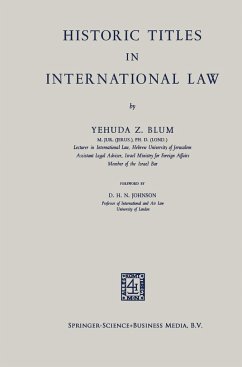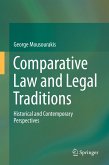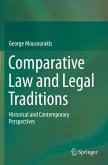Yehuda Z. Blum
Historic Titles in International Law
Yehuda Z. Blum
Historic Titles in International Law
- Broschiertes Buch
- Merkliste
- Auf die Merkliste
- Bewerten Bewerten
- Teilen
- Produkt teilen
- Produkterinnerung
- Produkterinnerung
The question of Historic Titles in International Law has been much discussed in recent years. In particular, it was an issue of some im portance in several international arbitrations, such as the Gulf of Fon seca case, decided by the Central American Court of Justice; the Island of Palmas case, decided by Judge Huber as sole arbitrator, under the auspices of the Permanent Court of Arbitration; the case concerning the Legal Status rif Eastern Greenland before the Permanent Court of International Justice; and, more recently still, the cases concerning Fisheries (United Kingdom v. Norway);…mehr
Andere Kunden interessierten sich auch für
![Ukrainian Healthcare Law in the Context of European and International Law Ukrainian Healthcare Law in the Context of European and International Law]() Ukrainian Healthcare Law in the Context of European and International Law75,99 €
Ukrainian Healthcare Law in the Context of European and International Law75,99 €![Ukrainian Healthcare Law in the Context of European and International Law Ukrainian Healthcare Law in the Context of European and International Law]() Ukrainian Healthcare Law in the Context of European and International Law75,99 €
Ukrainian Healthcare Law in the Context of European and International Law75,99 €![The Court of the European Communities: New Dimension in International Adjudication The Court of the European Communities: New Dimension in International Adjudication]() Werner FeldThe Court of the European Communities: New Dimension in International Adjudication41,99 €
Werner FeldThe Court of the European Communities: New Dimension in International Adjudication41,99 €![Archaeological and/or Historic Valuable Shipwrecks in International Waters:Public International Law and What It Offers Archaeological and/or Historic Valuable Shipwrecks in International Waters:Public International Law and What It Offers]() Eke BoestenArchaeological and/or Historic Valuable Shipwrecks in International Waters:Public International Law and What It Offers41,99 €
Eke BoestenArchaeological and/or Historic Valuable Shipwrecks in International Waters:Public International Law and What It Offers41,99 €![Comparative Law and Legal Traditions Comparative Law and Legal Traditions]() George MousourakisComparative Law and Legal Traditions90,99 €
George MousourakisComparative Law and Legal Traditions90,99 €![The Procedural Status of the Individual before International and Supranational Tribunals The Procedural Status of the Individual before International and Supranational Tribunals]() W. Paul GormleyThe Procedural Status of the Individual before International and Supranational Tribunals41,99 €
W. Paul GormleyThe Procedural Status of the Individual before International and Supranational Tribunals41,99 €![Comparative Law and Legal Traditions Comparative Law and Legal Traditions]() George MousourakisComparative Law and Legal Traditions90,99 €
George MousourakisComparative Law and Legal Traditions90,99 €-
-
-
The question of Historic Titles in International Law has been much discussed in recent years. In particular, it was an issue of some im portance in several international arbitrations, such as the Gulf of Fon seca case, decided by the Central American Court of Justice; the Island of Palmas case, decided by Judge Huber as sole arbitrator, under the auspices of the Permanent Court of Arbitration; the case concerning the Legal Status rif Eastern Greenland before the Permanent Court of International Justice; and, more recently still, the cases concerning Fisheries (United Kingdom v. Norway); Minquiers and Ecrehos Islets (U nited Kingdom v. France) ; Certain Frontier Land (Belgium v. N ether lands); and Temple rif Preah Vihear (Cambodia v. Thailand), before the International Court of Justice. Historic Titles are probably also a re levant factor in a number of territorial disputes that have not yet been submitted to arbitration or judicial settlement. The recent controversies over the proper breadth for the territorial sea and the exclusive fishing limits of coastal States have brought to the fore new aspects of the problem.
Hinweis: Dieser Artikel kann nur an eine deutsche Lieferadresse ausgeliefert werden.
Hinweis: Dieser Artikel kann nur an eine deutsche Lieferadresse ausgeliefert werden.
Produktdetails
- Produktdetails
- Verlag: Springer / Springer Netherlands
- Softcover reprint of the original 1st ed. 1965
- Seitenzahl: 388
- Erscheinungstermin: 1. Januar 1965
- Englisch
- Abmessung: 235mm x 155mm x 21mm
- Gewicht: 593g
- ISBN-13: 9789401502016
- ISBN-10: 9401502013
- Artikelnr.: 40767023
- Herstellerkennzeichnung Die Herstellerinformationen sind derzeit nicht verfügbar.
- Verlag: Springer / Springer Netherlands
- Softcover reprint of the original 1st ed. 1965
- Seitenzahl: 388
- Erscheinungstermin: 1. Januar 1965
- Englisch
- Abmessung: 235mm x 155mm x 21mm
- Gewicht: 593g
- ISBN-13: 9789401502016
- ISBN-10: 9401502013
- Artikelnr.: 40767023
- Herstellerkennzeichnung Die Herstellerinformationen sind derzeit nicht verfügbar.
I. Introduction.- 1. The acquisition of territory: the evolution of the modern concept.- 2. The acquisition of territory: the differing approach of academic and practising lawyers.- 3. The various modes of acquiring territory - Classification.- 4. Plan of the work.- II. Prescription in International Law.- 5. The distinction between acquisitive prescription and extinctive prescription.- 6. Prescription as a private law concept.- 7. Private law concepts in international law.- 8. Divergence of the definition of prescription between the continental and English legal systems.- 9. Prescription in municipal law - Roman law.- 10. Prescription in municipal law - English law.- 11. Prescription in municipal law - Conclusions.- 12. Doctrinal reasons for the existence of prescription in international law.- 13. The existence of prescription in international law ? Opinions of writers.- 14. The existence of prescription in international law - Judicial decisions rendered by international tribunals.- 15. The existence of prescription in international law - Judicial decisions rendered by municipal courts.- 16. The existence of prescription in international law - Practice of States.- III. Acquiescence as the Juridical Basis of an Historic Title.- 17. General.- 18. The creation of a customary rule of international law - The generality of practice and the time element.- 19. The creation of a customary rule of international law - Opinio jurisand acquiescence.- 20. The consensual basis of customary international law.- 21. Recognition and acquiescence.- 22. The role of the time element in the creation of special customary or "historic" rights.- 23. Some historic rights viewed as remainders of more extensive ancient rights.- 24. Non-exclusive historic rights.- 25.Acquiescence versus prescription as the legal basis of historic rights.- 26. Acquiescence as the juridical basis of historic rights - Opinions of writers.- 27. Acquiescence as the juridical basis of historic rights - Opinions of learned bodies.- 28. Acquiescence as the juridical basis of historic rights - Decisions of international tribunals.- 29. Acquiescence as the juridical basis of historic rights - Decisions of municipal courts.- 30. Acquiescence as the juridical basis of historic rights - State practice.- 31. Acquiescence and estoppel.- IV. The Requirements for the Formation of an Historic Title and its Constituent Elements.- 32. Introductory.- 33. Effective display of State authority - General.- 34. Effective display of State authority - The notion of continuity in respect of territorial situations.- 35. Effective display of State authority - Intention and will to act as sovereign.- 36. Effective display of State authority - Manifestations of State sovereignty.- 37. Effective display of State authority - Possession à titre de souverain.- 38. Acquiescence in the display of State authority - General.- 39. Acquiescence in the display of State authority - The meaning of "acquiescence".- 40. Notoriety of territorial situations.- 41. Is notification a prerequisite of notoriety?.- 42. Constructive knowledge.- 43. The plea of excusable ignorance.- 44. The relevance of protest to the formation of an historic title.- 45. The conditions for the validity of a protest.- 46. Anticipatory protest.- 47. Protest as a bar to the acquisition of an historic title.- 48. The repetition of protest.- 49. The relevance of the protest of a single State.- 50. Lack of protest does not always indicate acquiescence.- 51. The geographical element in the formationof an historic title.- 52. The role of "legitimate interests" in the formation of an historic title.- 53. The role of the time element in the formation of an historic title.- V. Miscellaneous Problems of Interpretation and Evidence Relating to the Acquisition of an Historic Title.- 54. General.- 55. The application of intertemporal law in the interpretation of an historic title.- 56. The selection, of the "critical date".- 56. 57. The relative strength of competing claims.- 58. The burden of proving an historic title.- 59. Strict geographical interpretation of an historic title.- VI. Juridical Aspects Specifically Related to the Formation of Maritime Historic Titles.- 60. General.- 61. The impact of the principle of the freedom of the high seas on the formation of maritime historic rights.- 62. What is international acquiescence?.- 63. Manifestations of State authority over maritime areas.- 64. Historic waters - Historic bays in general.- 65. Can multinational bays be claimed as historic bays?.- 66. The effects of territorial changes along the coast of a bay.- 67. Historic waters other than historic bays - Historic rights of delimitation.- 68. Historic waters other than historic bays - Water areas lying within and around island formations.- 69. Historic waters other than historic bays - Historic rights to a greater breadth of the territorial sea.- 70. The juridical status of historic waters - Historic waters are internal waters.- 71. The juridical status of historic waters - The distinction between internal inland waters and internal non-inland waters.- 72. The juridical status of historic waters - Multinational bays.- 73. Non-exclusive historic rights over maritime areas.- 74. Historic rights of fishing.- 75. Are claims to the sea-bed and subsoilof an "historic" character ?.- 76. Sedentary fisheries as historic rights.- VII. Conclusions.- 77. Consolidation as the legal root of historic titles.- 78. Critical appraisal of the doctrine of historic titles.- Appendix - Uti possidetis in international law.- Selected bibliography.- Index of Names.- General Indepc.
I. Introduction.- 1. The acquisition of territory: the evolution of the modern concept.- 2. The acquisition of territory: the differing approach of academic and practising lawyers.- 3. The various modes of acquiring territory - Classification.- 4. Plan of the work.- II. Prescription in International Law.- 5. The distinction between acquisitive prescription and extinctive prescription.- 6. Prescription as a private law concept.- 7. Private law concepts in international law.- 8. Divergence of the definition of prescription between the continental and English legal systems.- 9. Prescription in municipal law - Roman law.- 10. Prescription in municipal law - English law.- 11. Prescription in municipal law - Conclusions.- 12. Doctrinal reasons for the existence of prescription in international law.- 13. The existence of prescription in international law ? Opinions of writers.- 14. The existence of prescription in international law - Judicial decisions rendered by international tribunals.- 15. The existence of prescription in international law - Judicial decisions rendered by municipal courts.- 16. The existence of prescription in international law - Practice of States.- III. Acquiescence as the Juridical Basis of an Historic Title.- 17. General.- 18. The creation of a customary rule of international law - The generality of practice and the time element.- 19. The creation of a customary rule of international law - Opinio jurisand acquiescence.- 20. The consensual basis of customary international law.- 21. Recognition and acquiescence.- 22. The role of the time element in the creation of special customary or "historic" rights.- 23. Some historic rights viewed as remainders of more extensive ancient rights.- 24. Non-exclusive historic rights.- 25.Acquiescence versus prescription as the legal basis of historic rights.- 26. Acquiescence as the juridical basis of historic rights - Opinions of writers.- 27. Acquiescence as the juridical basis of historic rights - Opinions of learned bodies.- 28. Acquiescence as the juridical basis of historic rights - Decisions of international tribunals.- 29. Acquiescence as the juridical basis of historic rights - Decisions of municipal courts.- 30. Acquiescence as the juridical basis of historic rights - State practice.- 31. Acquiescence and estoppel.- IV. The Requirements for the Formation of an Historic Title and its Constituent Elements.- 32. Introductory.- 33. Effective display of State authority - General.- 34. Effective display of State authority - The notion of continuity in respect of territorial situations.- 35. Effective display of State authority - Intention and will to act as sovereign.- 36. Effective display of State authority - Manifestations of State sovereignty.- 37. Effective display of State authority - Possession à titre de souverain.- 38. Acquiescence in the display of State authority - General.- 39. Acquiescence in the display of State authority - The meaning of "acquiescence".- 40. Notoriety of territorial situations.- 41. Is notification a prerequisite of notoriety?.- 42. Constructive knowledge.- 43. The plea of excusable ignorance.- 44. The relevance of protest to the formation of an historic title.- 45. The conditions for the validity of a protest.- 46. Anticipatory protest.- 47. Protest as a bar to the acquisition of an historic title.- 48. The repetition of protest.- 49. The relevance of the protest of a single State.- 50. Lack of protest does not always indicate acquiescence.- 51. The geographical element in the formationof an historic title.- 52. The role of "legitimate interests" in the formation of an historic title.- 53. The role of the time element in the formation of an historic title.- V. Miscellaneous Problems of Interpretation and Evidence Relating to the Acquisition of an Historic Title.- 54. General.- 55. The application of intertemporal law in the interpretation of an historic title.- 56. The selection, of the "critical date".- 56. 57. The relative strength of competing claims.- 58. The burden of proving an historic title.- 59. Strict geographical interpretation of an historic title.- VI. Juridical Aspects Specifically Related to the Formation of Maritime Historic Titles.- 60. General.- 61. The impact of the principle of the freedom of the high seas on the formation of maritime historic rights.- 62. What is international acquiescence?.- 63. Manifestations of State authority over maritime areas.- 64. Historic waters - Historic bays in general.- 65. Can multinational bays be claimed as historic bays?.- 66. The effects of territorial changes along the coast of a bay.- 67. Historic waters other than historic bays - Historic rights of delimitation.- 68. Historic waters other than historic bays - Water areas lying within and around island formations.- 69. Historic waters other than historic bays - Historic rights to a greater breadth of the territorial sea.- 70. The juridical status of historic waters - Historic waters are internal waters.- 71. The juridical status of historic waters - The distinction between internal inland waters and internal non-inland waters.- 72. The juridical status of historic waters - Multinational bays.- 73. Non-exclusive historic rights over maritime areas.- 74. Historic rights of fishing.- 75. Are claims to the sea-bed and subsoilof an "historic" character ?.- 76. Sedentary fisheries as historic rights.- VII. Conclusions.- 77. Consolidation as the legal root of historic titles.- 78. Critical appraisal of the doctrine of historic titles.- Appendix - Uti possidetis in international law.- Selected bibliography.- Index of Names.- General Indepc.








